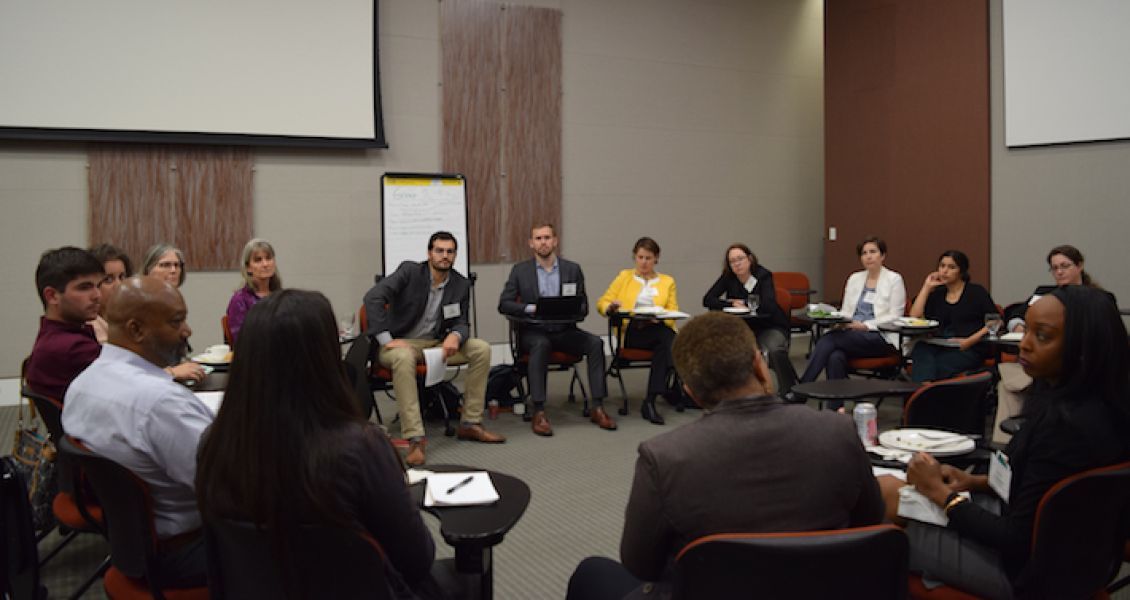The destructive wildfires throughout California in the past two years have highlighted the acute vulnerabilities that low-income residents and communities of color face, and the ensuing aftermath has underscored the barriers these populations encounter in preparing for and recovering from natural hazards. The growing risk of fires, earthquakes and drought calls for increased investments and inclusive approaches to resilience planning and disaster recovery for these communities.
With support from JPMorgan Chase, Enterprise is developing Democratizing Resilience Planning and Disaster Recovery to provide a platform for information sharing, tools and technical assistance to better facilitate inclusive community-driven decision-making in resilience planning and disaster recovery.
The initiative launched on June 17 with a daylong summit in partnership with the San Francisco Federal Reserve, PolicyLink and Northern California Grantmakers. More than 150 community organizations, philanthropists, local leaders and experts in disaster recovery and housing participated in a day of candid discussion to prioritize the needs of underserved populations and disinvested communities.
Measuring Exposure, Risk and Vulnerability
Analysis shows that 29 million Americans live in wildfire prone areas and that of this population, 12 million are considered socially vulnerable. Race, income, educational levels, existing health conditions, English language proficiency and immigration status are all factors that can make households more vulnerable and slower to recover after disasters.
Natural disasters are not merely natural phenomena: They are social, economic and political events that reveal underlying fault lines and disparities within communities and across regions.
Before disasters, these vulnerable populations are least likely to have insurance to finance rebuilding or savings to tide them over until permanent housing options become available.
Natural disasters also damage and destroy housing supply and drive up rents that result in displacement and homelessness, and in Northern California, one of the nation’s least affordable housing markets, the resulting housing shortage and rental costs are exponential.
Equity, Community Engagement and Cultural Competence
Michael McAfee, CEO of PolicyLink, an affordable housing research and advocacy organization, provided the convening’s keynote remarks. McAfee urged attendees to fight for the poor and disenfranchised people who are generally excluded from decision-making conversations. “Equity can start with our going into every meeting and centering with ‘Who do we serve?’.”
In resilience planning now, McAfee noted, decision makers need to disaggregate population data by race, income and location to plan in advance how best to mitigate specific vulnerabilities and to guide more equitable post-disaster recovery.
Marion Mollegen McFadden, senior vice president of public policy and senior advisor for Resilience at Enterprise, offered perspectives on key moments to influence the planning and disaster recovery process. She urged community organizers and nonprofits working with socially vulnerable communities to establish relationships with local government leaders and philanthropy before disaster strikes, which allows greater tactical influence on how recovery programs are organized and funds allocated.
She also encouraged greater local involvement in federal advocacy to build political will for more robust investment in pre-disaster mitigation and equitable disaster recovery. McFadden encouraged the initiative to identify ways of bolstering processes such as Community Development Block Grant – Disaster Recovery or traditional mitigation planning endorsed by states and cities.
Throughout the day of panels and discussion, attendees highlighted the need for greater cultural competence and proactive community engagement on the part of local government and service providers throughout the resilience planning and disaster recovery process.
The first panel on lessons from and opportunities for recovering from wildfire in California featured:
- Ben Metcalf, California Department of Housing and Community Development
- Elizabeth Brown, Community Foundation of Sonoma County
- Susan Shaw, North Bay Organizing Project
- Margaret Van Vliet, Sonoma County Community Development Commission
- Rich Gross, Enterprise Community Partners, who moderated the panel and is leading the Democratizing Resilience Planning and Disaster Recovery Initiative
Panelists discussed how disaster preparedness needs to be embedded in frontline communities, and that if planners and policymakers want residents to proactively prepare and mitigate risk, then they need adequate investment from government, the private sector and philanthropy.
A second panel explored promising approaches for boosting community engagement and empowerment in both pre-disaster and post-disaster planning and included:
- Nancy Beers, Center for Disaster Philanthropy
- Wilfredo “Wifi” Fernandez, Twitter
- Greg Guannel, University of the Virgin Islands
- Jacqueline Patterson, NAACP Environmental and Climate Justice Program
- Leslie Martinez, Leadership Counsel for Justice & Accountability
- Ellen LaPointe, Northern California Grantmakers, who moderated the discussion
Panelists urged attendees to value what residents are saying and what they know about their communities. The disaster recovery process should facilitate but not dictate the terms of community engagement.
The convening also featured an interview with a wildfire survivor, an immigrant and non-native English speaker, who experienced discrimination from the very providers tasked with serving displaced residents. She rebuked a disaster recovery system that too frequently only operates in English and, based on personal experience, shared the importance of listening to the needs of disaster survivors on a more personal level, no matter their race, immigration status or income.
Enterprise and our partners encourage broad participation in this groundbreaking work and look forward to building and strengthening partnerships across Northern California to build a more resilient and equitable region.
For more information on Democratizing Resilience Planning and Disaster Recovery, contact Laurie Schoeman.
